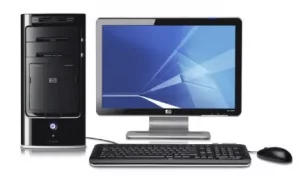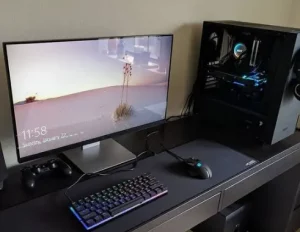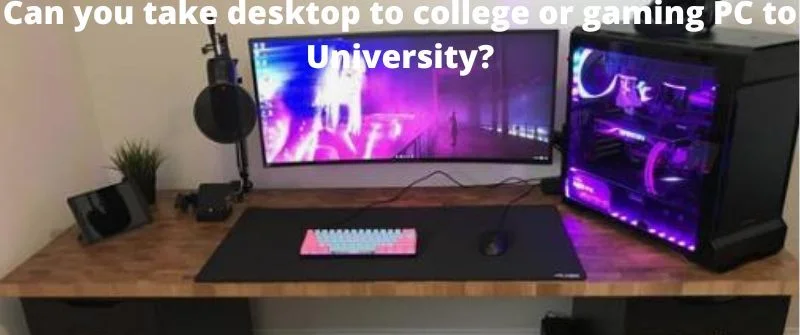Taking your desktop to college sounds like a weird idea especially with laptops available these days. But this does not mean that desktops are prohibited in colleges.
On the other hand, in today’s world, gaming has become more popular not only with children but also among adults especially college and university students.
There is a lot of free time for university and college students who mostly prefer spending it playing video games.
Can you take a Desktop to College?
You can take your desktop to college if you will actively use it for work, learning, or beneficial recreational activities like gaming. Also, if the PC will help you study and not interfere with school work, you can carry it to college.
However, you have to consider space and portability to make the move convenient.
Your college room must be spacious and in a secure place. Also, there should be enough power outlets and a reliable internet connection.

If these conditions cannot be met, then it is better to leave your desktop at home.
To add to that, it is good to leave your desktop home for the first semester in order to access the situation at college and establish whether the above conditions can be met.
Also, in schools where students change dorms regularly, it is good not to carry your desktop with you.
Issues or Rules of Using Desktop in College
1. Space
Desktops need space. If your college room is not spacious then carrying your desktop to school will be minimizing the already used up space.
Space is needed because you will need a table to place your monitor, keyboard, mouse, and CPU. Additionally, you will need a chair to use the desktop.
Also, in colleges where students are supposed to share rooms, it is good to leave your desktop home to avoid collisions with roommates over space. Such collisions can make you hate your college life.
2. Power
You cannot use a desktop without enough power. If there are no power plugs in the students’ dorms and hostels, then there is no need of carrying your device to college.
Also, the desktop needs to be connected to power every time you are using it. Therefore, there should be enough power outlets in the rooms where students reside.
If you share a room with other students and there is only one power outlet, there will always be inconvenience every time you want to use the desktop and the other students are using the power outlet
3. Portability
You cannot carry your desktop to class or change its location from one place to another easily. If you need a computer device in class, then it is obvious that you should purchase a laptop.

The amount of equipment that a desktop computer has is hard and stressful to carry or move around.
If you have to carry your desktop to college then it is better to keep it in the dorm or the hostel of residence.
These are the only places where you can use the desktop comfortably and establish a reliable and constant internet source.
4.Security
Desktop computers are very expensive. If you want to carry one to college or university you must make sure that safety is guaranteed in your area of residence.
This is why you don’t have to carry it to school in at least the first year of study especially if you are moving to a new place
5. College Dorms
Most college dorms are shared. Therefore, if you carry your desktop to college then you will have your roommates wanting to use it.
If you like to enjoy your privacy and not worry about exposing your data to other students then you will have to leave your desktop at home or find a room for yourself.
Are Gaming PCs Acceptable in College?
Gaming Pcs are acceptable in colleges because there are no prohibiting rules. Just like with the desktop you will have to ensure that you have space, power, privacy, and a reliable internet connection before you bring your gaming PC to college.
Factors to Consider Before Bringing a Gaming PC to University
1. Distraction
Gaming mostly distracts you from the main purpose of joining University which is studying. There is a lot of work in university and keeping up with assignments and tests while gaming can be a challenge.
This can be controlled if you play your games for a few minutes for relaxation but there is always a temptation to play for long hours. To avoid the temptation, leave your gaming Pc at home.
2. The use
If you only use your PC for entertainment and gaming, then it is advisable to leave it at home.
However, if you have monetized your gaming in different streaming channels then you can carry your gaming PC to university and keep on earning and help raise your fees and provide for other needs.
Also, you can carry your gaming PC to college if you will use it to study. Despite being a gaming PC, it can run applications such as Word, Excel, and Google which can help students study.

3. Safety
Gaming PCs are very expensive compared to laptops. If you have to carry yours to university you should ensure that the place you are staying is safe to keep such a valuable device.
Theft is very common in universities and someone may break into your room and steal your device if there is not much security provided.
4. Space and ventilation
Most rooms that are provided by universities are not spacious. Also, these rooms have to be shared among students.
Therefore, carrying your gaming PC to college will minimize the small space available and may cause conflicts between you and your roommates.
Also, these rooms do not have much ventilation. Therefore, with the amount of heat that gaming PCs generate the temperature levels in the room could be unbearable.
5. Limited socializing
Gaming is very addictive. Anyone who has been into gaming can attest to the hours wasted in the never-ending gaming challenges.
As a result, university students have less time for socializing. One advantage of joining a university is the chance to meet people from all walks of life and have a new experience.
This becomes limited with the hours wasted in gaming. Therefore, leaving your gaming PC at help can help you learn new things and socialize more.

Joseph is a freelance journalist and a part-time writer with a particular interest in the gig economy. He writes about schooling, college life, and changing trends in education. When not writing, Joseph is hiking or playing chess.
